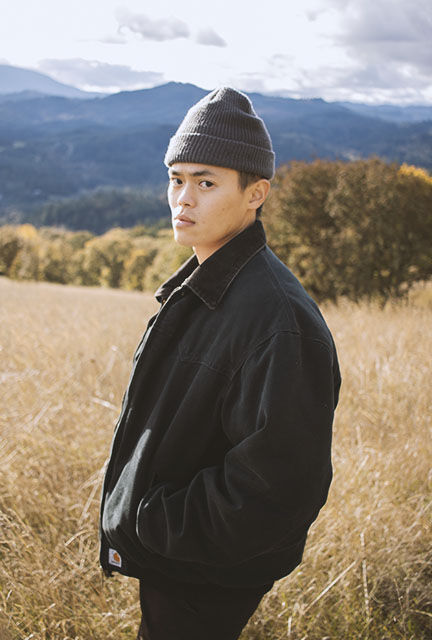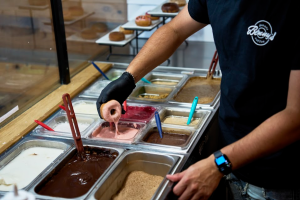International Perspectives: Experiencing the American Dream
November 12, 2020
The ‘American dream’ has a different meaning for everyone, for some it might mean the opportunity to find themselves in a far away land, for others it means to succeed in their career goals through hard work and for some it means to create meaningful memories and relationships in the United States.
VANIA HALIM
Vania Halim, a fourth year Chemical Engineering student, is an international student from Indonesia, but she lived in Singapore for nine years and considers Singapore her home.
Growing up, she attended an American international school which shaped who she is as a student. When she graduated high school, she knew she wanted to get her Bachelor’s degree in the U.S. and she chose to study at Oregon State University after being offered a scholarship as a scholar and speaker in the International Cultural Service Program.
“Thanks to my education in Singapore, my transition as an international student went very smoothly, and I’ve had a very pleasant experience in the U.S. From my professors, I learned to see the beauty of math and physics despite (or maybe because of) the challenging coursework of an engineering degree,” Halim said via email.
“Through my involvements in cultural organizations, campus ministry, research and residential education I’ve been able to meet many people and hear their stories.”
Halim said both her education and involvement in the OSU community have given her a sense of how wide and beautiful the world is. She is fortunate to have parents who value education to the extent that they were willing to send her across the world to pursue a degree, and that it is a priceless experience that she will always treasure and be grateful for.
“When I came here, I didn’t even know what Chemical Engineering was or what I wanted to do with it. Amazingly enough, at a time when I doubted whether I wanted to stay in this major or not, I learned about biotechnology and instantly fell in love,” Halim said.
“My role as an RA and student officer up to that point had really taught me a lot about myself, and I was learning more and more that my strongest motivators for any work I chose to do were the people it served.”
Halim felt that being in the field of biotechnology she would have many opportunities to impact lives, and this feeling is what keeps her going through the tiring nights.
“When I’ve heard the concept of the ‘American Dream,’ I’ve understood it to be the idea that America is a place of independence and freedom where you can leave your past behind and achieve anything if you work hard enough,” Halim said. “This idea certainly appealed to my younger, headstrong self who so badly wanted to be ‘free’ from rules and authority.”
Halim used to think her family’s Chinese values, steeped in ancient philosophy, were too archaic to keep up with the ideals of freedom in the Western world.
“I thought myself to be so modern for wanting to be just like Americans. And then I came here, where I have independence in abundance,” Halim said via email. “I live alone, I manage my time and finances, and I make many of the decisions my parents had previously made for me.”
Halim said ironically it is in the environment from the U.S. that she has grown to value family, authority and the wisdom of her elders far more than she ever has.
“It’s taught me that I don’t need or want to chase the American Dream, when what matters most to me are the people who have been by my side for as long as I’ve known what it is to be alive,” Halim said.
ALIMA MATYEVA
Alima Matyeva, a third year Computer Science student with minors in New Media Communications and Writing, is an international student from Kyrgyzstan. She said the company that helped her to apply to universities in the U.S. suggested she applied to Washington State University, Colorado State University and Oregon State University.
“I was accepted to all three of them but eventually chose OSU. My high school teacher of Academic Writing was from Oregon,” Matyeva said via email. “He highly recommended me to choose OSU rather than other universities as I would have at least one friend there, [meaning him].”
Matyeva said at first it was very hard for her to live in the U.S. because she didn’t know anyone in the whole country except from her high school teacher. But at the time of her arrival to the U.S., he was living in Kyrgyzstan.
“Everything was so new, [and] I was scared but excited at the same time. OSU’s campus was huge and beautiful for me, at first I even had troubles with navigating there,” Matyeva. “I studied [at] INTO OSU and really liked the orientation week they organized for us, where all the international students had [an] opportunity to meet and learn from each other.”
Matyeva said most people that she met at INTO orientation are still her close friends. She said the friends that she met at INTO were also new to the country and OSU, so they helped each other with useful tips for situations that were unusual for them.
“Sometimes I had conflicts with some people due to cultural misunderstanding: what was acceptable for me wasn’t acceptable for them and vice versa,” Matyeva said. “I learnt a lot from my freshman year and [the] next two years were easier and more comfortable for me.”
Matyeva was only seventeen years old when she moved to the United States, so at first she did not have any goals except graduating with her Bachelor’s degree. After some years, her friends, classmates and professors have changed her perspective. Now she wants to learn as much as possible from her classes to create something fresh and useful for people either in the U.S. or her home country.
“I’ve heard about ‘American Dream’ a lot. I agree that success can be reached after hard work, risks and sacrifice rather than just a chance, but luck can always be an essential part of life,” Matyeva said. “I want to believe that everyone can achieve what is called [the] ‘American Dream’ and become successful no matter whether you’re an American or someone who came from a country far away from the U.S.”
TZU-HAO HUANG
Tzu-Hao Huang, also called Chris, is a masters student in Electrical and Computer Engineering at OSU and has lived in the United States for two years.
Huang is an international student from Taiwan and decided to come to the U.S. because the most famous technology companies are located in the United States. He is also curious about learning from different cultures, and he would like to learn more English, being one of the most spoken languages.
“I lived in Portland for five months last year. The experience living there [was] very great! When I walk[ed] on the street, people say hi to me. It’s very common here, but it’s [rare] in Taiwan, so my first impression of the United States [has been good],” Huang said via email. “The best [moments I had] in Portland [was when] my Japanese friend and I went to a brewery after class and enjoyed [the sun while drinking]! It [was] very chill!”
Huang said studying at OSU is very stressful, but it is also a very academically-focused school which is good for students that want to improve their professional knowledge. He said that due to COVID-19 he has been taking all his classes remotely, which he does not enjoy.
“[Now] there is no big difference between taking classes in Taiwan and [the United States], “ Huang said. “No club activities mean I lose a way to make new American friends. Sharing different life experiences is the most interesting thing in a friendship.”
Huang said he had heard the phrase the ‘American dream’ before in Taiwan, and that the concept of the ‘American dream’ there is a little bit different than in the United States.
“In Taiwan, we would say that some people who want to immigrate to the United States or find a job here have an American dream,” Huang said. “It’s more like a dream about going to America. In the States, I think this is more like everyone is equal, everyone can succeed if they work hard.”
We all might have a different definition of what is the “American dream,” but we can all agree that people have always dreamt of a land in which life should be better, where everyone can reach their full potential regardless of their race, ethnicity, socio-economic status, age, and gender.






